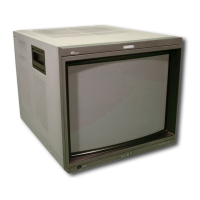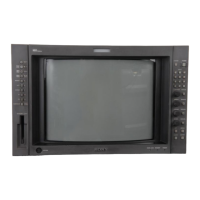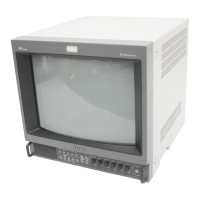Do you have a question about the Sony TRINITRON BVM-14F1E and is the answer not in the manual?
Warnings about fire, shock hazard, rain, moisture, and opening the cabinet.
Caution regarding explosion risk from incorrect battery replacement and disposal.
Instruction to install socket-outlet near equipment for easy accessibility.
Requirement for the apparatus to be earthed and wiring instructions for mains lead.
Product compliance with EMC and Low Voltage Directives, and relevant European standards.
Operating with correct power source, handling the unit, power cord, and socket-outlet.
Ensuring adequate air circulation and avoiding heat sources or direct sunlight.
How to clean the unit using mild detergent and avoiding strong solvents.
Avoiding proximity to magnetic objects to prevent picture distortion.
Cleaning the CRT surface gently and precautions regarding static discharge.
Describes the HR Trinitron picture tube and its resolution capabilities.
Explains the use of a separate control unit for certain models for space saving.
How to control multiple monitors via address and group numbers.
Using an optional memory card to save and load monitor settings.
Automatic adjustment of chroma, phase, and color temperature.
Modifying input connectors with optional adaptors.
Switching between aspect ratios for display.
Internal feedback circuit maintains constant color temperature.
Using a blue signal for monochrome display and adjustments.
Setting functions via on-screen menus.
Compatibility, connectors, test signals, VITC reader, Caption Vision, etc.
Monitor control units (BKM-10R, BKM-11R) and memory card.
Masks for 16:9 aspect ratio display.
Rack mount kits for installation.
Attachment kit for BKM-10R.
Modular adaptors for input configuration.
Details on BKM-20D and BKM-21D SDI adaptors.
BKM-22X for expanding SDI input channels.
NTSC, PAL, PAL-M, Tri-Standard adaptors.
BKM-28X and BKM-48X for expanding analog inputs.
Assembling the input/output panel with optional adaptors.
Notes on installing BKM-22X and signal format selection.
How adaptors are selected when multiple are installed.
Instructions for installing/removing BKM-20D/21D and radiation shield care.
Labeled diagram of the front panel for 14-inch models.
Labeled diagram of the front panel for 20-inch models.
Function of Tally lamp and POWER switch.
Function of DEGAUSS button and numeric keypad for input.
Buttons and knobs for manual adjustment of picture settings.
Notes on phase and chroma adjustment for specific signal types.
Description of MENU, UP/DOWN, ENTER buttons for menu navigation.
Function of POWER, STANDBY, and OVER LOAD lamps.
Diagram and labels for rear panel connectors and switches.
How the SHIFT button changes function button modes.
Functions available when SHIFT is OFF (green LEDs).
Functions available when SHIFT is ON (orange LEDs).
Details on 16:9, SYNC, BLUE ONLY, R/G/B, SAFE AREA functions.
Inserting and ejecting the BKM-12Y memory card.
Connecting control units or probes via the OPTION connector.
Location and function of main power switch and AC IN connector.
Information on fuse type and deflection option slot.
Connector for connecting monitor control units.
Description of BNC connectors for analog signals.
RS-485 serial remote connectors and terminate switch.
Number of adaptors that can be fitted.
Pin functions for parallel remote control.
Connector for Interactive Status Reporting system.
How menus are organized into levels and groups.
How to access the main menu and its items.
Brief description of each main menu category.
How menu numbers are used for navigation.
How the ADDRESS menu selects monitors for control.
Visual representation of menu system from main menu to level 2.
Description of buttons used for menu navigation.
Steps to display menus and move the cursor.
How to select items from lists and confirm settings.
How to input numerical data for settings.
Steps for entering text for channel names.
How to delete and re-enter characters.
Purpose of the menu for setting picture levels.
Hierarchical structure of the menu.
Description of sub-menus like PRESET, CH SET, MANUAL, AUTO, COPY.
Adjusting picture levels using knobs.
Using automatic adjustment with color bar signals.
Copying data from other channels, monitors, or memory cards.
Purpose of the menu for setting color temperature.
Knob adjustment, probe adjustment, and data copying.
List of compatible probes for automatic adjustment.
Hierarchical breakdown of the menu.
Selecting color temperature data sources.
Detailed steps for manual color temperature adjustment.
Setting initial values and selecting white signal.
Selecting probes and performing ADJUST/ANALYZE.
Specific operations for the BKM-14L probe.
Steps to perform automatic adjustment using a probe.
Using the ANALYZE menu to read probe values.
Operations for other compatible probes.
Copying color temperature data from other sources.
Applying fine adjustments (TRIM) to color temperature.
Selecting internal or external signals for adjustment.
Setting data for input signals and channels.
Mapping input connectors to channels.
Assigning serial digital, analog composite, Y/C, and RGB signals.
Hierarchical view of the input configuration menu.
Selecting signal format (COMPOSITE, YC, COMPONENT, SDI).
Settings for Y/C separation, sync, and screen mode.
Settings for safe area display and aperture adjustment.
Settings for filter, channel naming, and control values.
Settings for color temp, horizontal phase, and safety area position.
Copying input configuration data.
Details on AUTO, NTSC, PAL, SECAM, YUV formats.
Details on SDI AUTO, NTSC, PAL, 4:2:2 formats.
Details on Y/C filters, scan sizes, and safe area scaling.
Naming channels and character limits.
Setting remote control functions using REMOTE 1 and REMOTE 2.
Assigning addresses and groups for multi-monitor control.
Hierarchical structure for remote control settings.
Setting address, group, and mode for REMOTE 1.
Setting pin assignments for REMOTE 2.
Assigning functions to REMOTE 2 connector pins.
Purpose of password protection for menu settings.
How passwords are displayed and entered.
Hierarchical structure for password settings.
Steps to create and confirm a new password.
Selecting which menus to protect with a password.
Settings for channel entry, power-up, degauss delay, etc.
Hierarchical structure of the system configuration menu.
Setting channel entry methods and power-up states.
Settings for degauss timing and AFC constant.
Settings for residual subcarrier, auto chroma, and contrast/brightness hold.
Assigning F2 key for quick access to color temp adjustment.
Selecting on-screen information types and display.
Hierarchical structure for screen display settings.
Displaying VITC, user bit, and caption information.
Displaying SDI ancillary data, channel number, and name.
Setting positions for VITC, channel number, and channel name.
Purpose of the menu for adjusting convergence and geometry.
Hierarchical structure for alignment settings.
Adjusting rotation, horizontal/vertical position, and width.
Adjusting vertical linearity and VITS blanking.
Adjusting center contrast based on screen mode.
Correcting side pincushion distortion and balance.
Correcting corner pincushion and center bow distortion.
Correcting middle pincushion and trapezoid distortion.
Correcting horizontal linearity and its balance.
Adjusting static and dynamic vertical convergence.
Adjusting horizontal convergence at top and bottom of screen.
Adjusting horizontal convergence on the right side of the screen.
Adjusting horizontal convergence on the left side of the screen.
Overview of the four extended functions available.
Hierarchical structure of the extended functions menu.
Restoring factory default data for installed boards.
Reading and writing data to the memory card.
Restarting the monitor.
Adjusting setup and 100 IRE levels of internal white signal.
Choosing which monitor or group to control remotely.
SINGLE, GROUP, ALL, POWER ON/OFF, DISPLAY options.
Important notes on remote control, including GROUP mode and SHIFT button.
How to cancel the remote control mode.
How to exit the ADDRESS menu.
Quick selection of monitors in SINGLE, GROUP, or ALL modes.
List of items included with the monitor.
Specifications and pin assignments for probe cables.
Physical dimensions and dimensional drawings for different models.
Weight specifications for different monitor models.
Details on BNC, Mini-DIN, D-sub connectors.
Differential gain/phase, frequency response, DC restoration.
AFC time constant, line pull range, vertical/horizontal blanking.
Normal scan, underscan, linearity, color temperature specs.
Temperature, humidity, and pressure requirements.
Pin assignments for the Graseby SLS 9400 probe connection.
Pin assignments for the Minolta CA-100 probe connection.
Pin assignments for the Philips PM 5639 probe connection.
Pin assignments for the Thoma TF6 probe connection.
| Screen Size | 14 inches |
|---|---|
| Display Type | CRT |
| Aspect Ratio | 4:3 |
| Aperture Grille Pitch | 0.25 mm |
| Input Types | BNC, Composite, S-Video |
| Resolution (TV Lines) | 800 TV lines |
| Standard | NTSC, PAL |
| Scan Modes | Interlaced |











